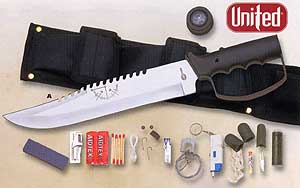Featured Member Video
Multipurpose Snare WireMore Videos by IA Woodsman
View larger or ask the author a question.
View all wilderness survival videos
Recent Forum Posts 
| Thread Title | Replies |
| SAD that this forum........DIED. | 8 |
| best | 0 |
| .......... | 2 |
| weather | 0 |
| AR Pistol Notice | 18 |
| What "ONE" Thing do you h... | 0 |
| "WAREAGLE" Wherefore art-... | 0 |
| Solar Eclipse April the 8th | 3 |
| Glock Knife | 1 |
| weather | 0 |
Come Join the Discussion Today!
Our site has been mentioned in:
U.S. News and World Report
Best of the Web - Site of the Week 8/6/01
Discovery Channel Canada
One Week in the Wilderness
USA Today
Hot Sites 08/08/2005
Sourcing Compost Materials
In most parts of the country, enough organic materials accumulate around an average home and yard to make all the compost a backyard garden needs. You probably have weeds, leaves, perhaps your own human hair (my wife is the family barber), dust from the vacuum cleaner, kitchen garbage and grass clippings. But, there may not be enough to simultaneously build the lushest lawn, the healthiest ornamentals _and _grow the vegetables. If you want to make more compost than your own land allows, it is not difficult to find very large quantities of organic materials that are free or cost very little.
The most obvious material to bring in for composting is animal manure. Chicken and egg raisers and boarding stables often give manure away or sell it for a nominal fee. For a few dollars most small scale animal growers will cheerfully use their scoop loader to fill your pickup truck till the springs sag.
As useful as animal manure can be in a compost pile, there are other types of low C/N materials too. Enormous quantities of loose alfalfa accumulate around hay bale stacks at feed and grain stores. To the proprietor this dusty chaff is a nuisance gladly given to anyone that will neatly sweep it up and truck it away. To the home gardener, alfalfa in any form is rich as gold.
Some years, rainy Oregon weather is still unsettled at haying season and farmers are stuck with spoiled hay. I'm sure this happens most places that grass hay is grown on natural rainfall. Though a shrewd farmer may try to sell moldy hay at a steep discount by representing it to still have feed value, actually these ruined bales must be removed from a field before they interfere with working the land. A hard bargainer can often get spoiled hay in exchange for hauling the wet bales out of the field
There's one local farmer near me whose entire family tree holds a well-deserved reputation for hard, self-interested dealing. One particularly wet, cool unsettled haying season, after starting the spoiled-hay dicker at 90 cents per bale asked—nothing offered but hauling the soggy bales out of the field my offer—I finally agreed to take away about twenty tons at ten cents per bale. This small sum allowed the greedy b——-to feel he had gotten the better of me. He needed that feeling far more than I needed to win the argument or to keep the few dollars Besides, the workings of self-applied justice that some religious philosophers call karma show that over the long haul the worst thing one person can do to another is to allow the other to get away with an evil act.
Any dedicated composter can make contacts yielding cheap or free organic materials by the ton. Orchards may have badly bruised or rotting fruit. Small cider mills, wineries, or a local juice bar restaurant may be glad to get rid of pomace. Carpentry shops have sawdust. Coffee roasters have dust and chaff. The microbrewery is becoming very popular these days; mall-scale local brewers and distillers may have spent hops and mash. Spoiled product or chaff may be available from cereal mills.
City governments often will deliver autumn leaves by the ton and will give away or sell the output of their own municipal composting operations. Supermarkets, produce wholesalers, and restaurants may be willing to give away boxes of trimmings and spoiled food. Barbers and poodle groomers throw away hair.
Seafood processors will sell truckloads of fresh crab, fish and shrimp waste for a small fee. Of course, this material becomes evil-smelling in very short order but might be relatively inoffensive if a person had a lot of spoiled hay or sawdust waiting to mix into it. Market gardeners near the Oregon coast sheet-compost crab waste, tilling it into the soil before it gets too "high." Other parts of the country might supply citrus wastes, sugar cane bagasse, rice hulls, etc.
Back to CompostingUltimate Survival Knife & Kit |
List Price: 61.99 Our Price: 39.95 |
This 15 inch survival knife with drop point blade features a thick quality stainless steel blade with serrated top edge. Textured and ribbed solid metal handle and guard. Nylon sheath. Survival kit includes a hollow grip with a compass top to store items within the knife itself, as well as additional pouches on the sheath to hold the rest. Complete survival kit. Click Here to Buy the Survival Knife Now. |
|

